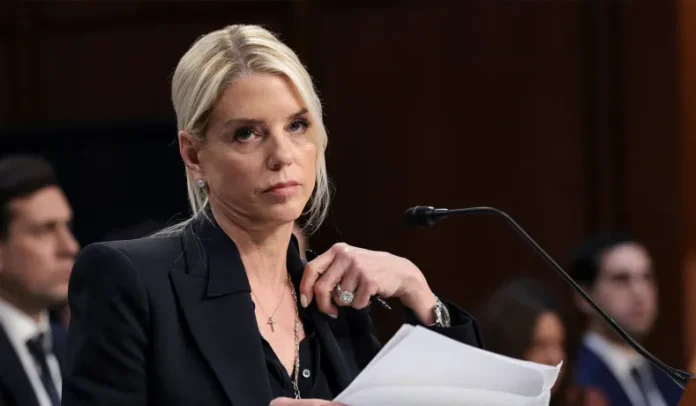A storm of legal trouble has landed on Democratic Congresswoman Sheila Cherfilus-McCormick. On Wednesday, a federal grand jury in Miami indicted her and several co-defendants, alleging they stole roughly $5 million in FEMA disaster-relief funds—a stunning accusation that could lead to decades behind bars.
Cherfilus-McCormick, who represents Florida’s 20th District across Broward and Palm Beach counties, is accused of using her family’s home-health-care company, Trinity Healthcare Services, as a vehicle for the alleged fraud. Prosecutors claim that an overpayment tied to a COVID-19 vaccination staffing contract was funneled through multiple accounts, obscuring its origins, with much of the money eventually redirected into political contributions.
Her brother, Edwin Cherfilus, is named as a co-conspirator, accused of participating in the scheme to divert FEMA funds for personal and political use. Federal authorities allege that Cherfilus-McCormick also conspired with her tax preparer, David K. Spencer, to submit a false tax return—mislabeling personal expenses as business deductions and inflating charitable contributions to reduce her tax liabilities. If convicted, the congresswoman could face up to 53 years in prison; her brother, up to 35 years.
This indictment comes against a backdrop of intense scrutiny over Cherfilus-McCormick’s financial dealings during the pandemic. In late 2024, Florida’s Division of Emergency Management filed suit against Trinity Healthcare Services, alleging the company overcharged the state by nearly $5.8 million for COVID-19 vaccine registration services and refused repayment.
The lawsuit began with a single $5 million overpayment, but it quickly triggered deeper questions about Trinity’s management of significant public contracts during a national crisis.
The House Ethics Committee had already extended its investigation into Cherfilus-McCormick’s dramatic increase in personal income, noting a surge of over $6 million in 2021—far surpassing her earnings from the previous year. Most of that increase was linked to consulting and profit-sharing fees from Trinity, raising further questions about potential conflicts of interest and self-enrichment.
According to the indictment, the FEMA-funded contract in 2021 resulted in an overpayment of roughly $5 million. Prosecutors allege that Cherfilus-McCormick and co-defendant Nadege Leblanc then organized straw-donor schemes, channeling the funds into political donations through friends and relatives, creating the illusion of legitimate contributions.
The scheme allegedly included careful coordination to disguise the source of the money and misrepresent it on official filings.
Born in Brooklyn, Cherfilus-McCormick earned a B.A. from Howard University and a J.D. from St. Thomas University School of Law. She served as CEO of Trinity Healthcare Services before winning a 2022 special election to Congress following the death of longtime Representative Alcee Hastings. Her election made her the only Haitian-American Democrat serving in Congress.
Attorney General Pam Bondi condemned the alleged actions, stating, “Using disaster relief funds for self-enrichment is a particularly selfish, cynical crime. No one is above the law, least of all powerful people who rob taxpayers for personal gain. We will follow the facts in this case and deliver justice.”
The indictment has also drawn reactions from political opponents. Elijah Manley, running against Cherfilus-McCormick in the Democratic primary, wrote on social media, “Today’s indictment of my opponent, Congresswoman Sheila Cherfilus-McCormick, is a sad moment for the people of Florida’s 20th Congressional District.
I am disappointed that the Congresswoman abused the power she was given and instead used it to enrich herself and her family. The people of FL-20 are ready to move past this era of fraud, corruption, and distractions.”
This case is now the latest chapter in a series of ethics and legal questions surrounding Cherfilus-McCormick. It highlights the complex intersection of political power, corporate oversight, and accountability, especially in cases involving emergency funds designed to help vulnerable communities during crises.
The unfolding legal process will be closely watched, not only for its implications for the congresswoman and her associates but also for broader questions about transparency, governance, and trust in public institutions.
As federal investigators prepare to pursue the case, the Florida 20th District—and the nation—will be observing every development. How this story unfolds could shape public confidence in elected officials and underscore the stakes of safeguarding taxpayer funds in a politically charged environment.



